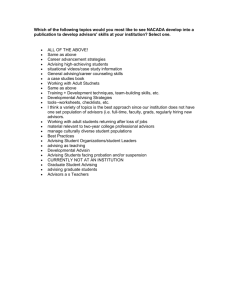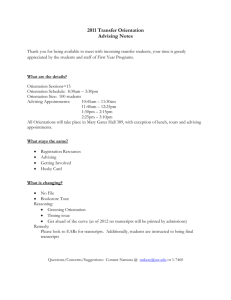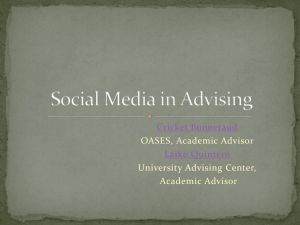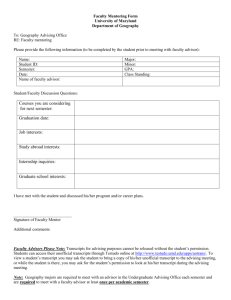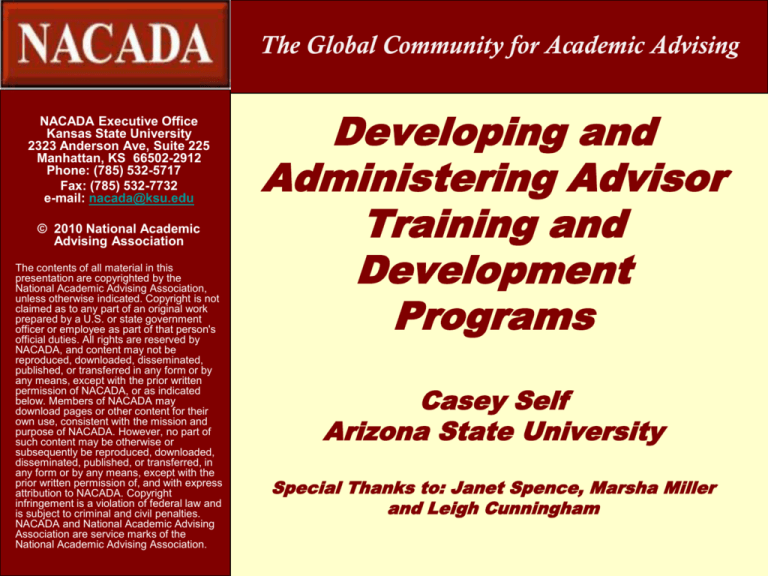
The Global Community for Academic Advising
NACADA Executive Office
Kansas State University
2323 Anderson Ave, Suite 225
Manhattan, KS 66502-2912
Phone: (785) 532-5717
Fax: (785) 532-7732
e-mail: nacada@ksu.edu
© 2010 National Academic
Advising Association
The contents of all material in this
presentation are copyrighted by the
National Academic Advising Association,
unless otherwise indicated. Copyright is not
claimed as to any part of an original work
prepared by a U.S. or state government
officer or employee as part of that person's
official duties. All rights are reserved by
NACADA, and content may not be
reproduced, downloaded, disseminated,
published, or transferred in any form or by
any means, except with the prior written
permission of NACADA, or as indicated
below. Members of NACADA may
download pages or other content for their
own use, consistent with the mission and
purpose of NACADA. However, no part of
such content may be otherwise or
subsequently be reproduced, downloaded,
disseminated, published, or transferred, in
any form or by any means, except with the
prior written permission of, and with express
attribution to NACADA. Copyright
infringement is a violation of federal law and
is subject to criminal and civil penalties.
NACADA and National Academic Advising
Association are service marks of the
National Academic Advising Association.
Developing and
Administering Advisor
Training and
Development
Programs
Casey Self
Arizona State University
Special Thanks to: Janet Spence, Marsha Miller
and Leigh Cunningham
The Global Community for Academic Advising
The absence of consistent and
systematic training weakens the
quality and effectiveness of academic
advising. The lack of training also
contributes to misperceptions about
advising and serves to undermine
the status of advising and advisors
on many campuses… (Brown, 2008).
The Global Community for Academic Advising
Where do we start
and where do we
need to go?
The Global Community for Academic Advising
What “type” of training and
development program do
we need to create?
o An orientation program for new advisors?
o A professional development program (or
continuing education program) for
experienced advisors?
o Or both?
The Global Community for Academic Advising
Who is our audience?
o New faculty advisors?
o Experienced faculty advisors?
o New staff advisors?
o Experienced staff advisors?
o Peer advisors?
The Global Community for Academic Advising
What content needs to
be included?
•What will be on the
agenda?
The Global Community for Academic Advising
No matter the audience, 3 common
elements need to be incorporated
into the content of the training and
development program:
Conceptual, Relational, and
Informational (Habley, 1986, King,
2000, and Brown 1998).
The Global Community for Academic Advising
Conceptual: What advisors need to
understand about the students they serve, as
well as about their work as advisors.
Informational: What advisors need to
understand and know about institutional
policies, procedures and programs
Relational: The skills and attitudes advisors
need to use to engage students in goal setting,
academic planning and decision making.
(Brown, 2002)
The Global Community for Academic Advising
“Without understanding
(conceptual elements)
there is no context for
the delivery of service.
Without information,
there is no substance to
advising. And without
interpersonal skills
(relational), the
advisee/advisor
Wes Habley
interaction is left to
Advisor Training: Exemplary Practices in
the Development of Advisor Skills
chance.”
The
The Global Community for Academic Advising
How do we develop a
process for collaboration and
buy-in?
o Who are the players on campus who
have an interest/need to be involved in
the planning of the training and
development program?
The Global Community for Academic Advising
Ten steps for creating an
advisor training and
development program
The Global Community for Academic Advising
T&D
Committee
Needs
Analysis
Revisions
Certificate
of
Completion
Evaluation
Assign
Content to
Elements
Method of
Delivery
Marketing
Assessment
Spence, 2010
Goals and
Outcomes
10 Steps in
Creating an
Advisor
Training and
Development
Program
The
The Global Community for Academic Advising
STEP 1: Create an Advisor
Training and Development
Advisory Committee
o Include representatives from all
interested groups.
o Include representatives
from non-advising areas
And/or other stakeholders
The Global Community for Academic Advising
STEP 2: Create a training
and development needs
analysis
Find out what advisors need/want to learn with
Surveys
Focus Groups
The Global Community for Academic Advising
STEP 3: Develop goals and
outcomes for the training
and development program
The Global Community for Academic Advising
Goals address the purpose of the
program. Why are we developing this
training and development program?
Outcomes are the things we expect
advisors to learn as a result of
participating in the program.
The Global Community for Academic Advising
Outcomes Example
New Advisor
Program
The advisor will
Conceptual understand the
university’s mission for
academic advising.
Relational The advisor will
understand student
expectations in the
advising relationship.
The advisor will
Informational understand the course
repeat policy for the
university.
Experienced Advisor
Program
The advisor will comprehend
career counseling theory.
The advisor will demonstrate
effective conflict resolution
skills.
The advisor will know how to
direct students to scholarship
opportunities
The Global Community for Academic Advising
Establish goals and outcomes
that are SMART
Specific
Measurable
Achievable
Realistic
Tangible
(Brown, 1998; King, 2000)
The Global Community for Academic Advising
STEP 4: Analyzing the results of
the needs analysis and using
outcomes identified for the
program, assign content into
three categories of elements:
oConceptual
oRelational
oInformational
The Global Community for Academic Advising
STEP 5: Develop the method
for the delivery of the content
The Global Community for Academic Advising
Resources available to you:
•Experienced advisors and/or faculty
•Campus administrators/ subject experts
•NACADA Academic Advising Consultants
and Speakers Service
•NACADA Clearinghouse
•NACADA Publications
•Others?
The Global Community for Academic Advising
STEP 6: Develop Assessment:
How do we know the participants
met the outcomes?
The Global Community for Academic Advising
oApplication of knowledge in
essay format. Participants answer
questions to demonstrate
application. A rubric is used to
evaluate the results.
oObjective exams: multiple choice,
matching, fill in the blank, etc.
oRole play or demonstration
The Global Community for Academic Advising
STEP 7: Marketing and
Communication: How will
you invite advisors to
participate in the program?
The Global Community for Academic Advising
STEP 8: Program
Evaluation: How will you
find out what the participants
thought about the program?
oIn-person session evaluation
oOn-line survey
oFocus Group
The Global Community for Academic Advising
What information would be
helpful in order to improve the
program in the future?
oWere there any suggestions for adding or
deleting content?
oDid the participants like the program?
oDid they prefer a different delivery method?
oDid the participants believe it met their
needs?
The Global Community for Academic Advising
STEP 9: Acknowledge
Completion of Program
oPresent framed certificate
oSend letter to participant and to
supervisor
oAdministration participation and
visibility
oOther?
The Global Community for Academic Advising
STEP 10: Revise program for
next year or cohort
Top 5 topics most often covered in training sessions
include:
Academic regulations and policies
Campus Referral sources
Use of information sources (test results,
transcripts, etc.)
Importance of Academic Advising
Definition of Advising
Wes Habley (2004).
The Status of Academic Advising: Findings from the
ACT Sixth National Survey
Which of our three foundational components (conceptual,
informational, relational) are under-represented?
NACADA Clearinghouse of Academic
Advising Resources
• Informational resources
• Relational skills
• Conceptual theories
NACADA Homepage: http://www.nacada.ksu.edu/
Clearinghouse Exploration
Informational
»Information to improve advisor
knowledge and develop professionally
Relational
Conceptual
Statement of Core Values of Academic Advising
Advisors are responsible:
to the individuals they advise
for involving others, when
appropriate, in the advising
process
to their institutions
to higher education
to their educational
community
for their professional practices
and for themselves personally
Council for The Advancement of
Standards (CAS) for Academic Advising
• 14 total Standards and Guidelines
1)Mission
2) Program
3) Leadership
4) Human Resources
5) Ethics
6) Legal Responsibilities
7) Equity and Access
8) Diversity
9) Organization and Management
10) Campus and External Relations
11) Financial Resources
12) Technology
13) Facilities and Equipment 14) Assessment and Evaluation
Council for the Advancement of Standards in Higher Education
Developing Advisor Skills: Deep in the Heart of
NACADA Resources
Developing Advisor Skills: Deep in
the Heart of NACADA Resources
Developing Advisor Skills: Deep in
the Heart of NACADA Resources
Compiled by Tom Grites
Clearinghouse Exploration
Informational
Relational
Conceptual
NACADA
National ACademic ADvising Association
Developing Advisor Skills: Deep in
the Heart of NACADA Resources
Developing Advisor Skills: Deep in the
NAC
A
D
A
Developing Advisor Skills: Deep in the Heart of
National ACademic ADvising Association
Heart of NACADA Resources
NACADA Resources
NACADA Resources: The Fast Pass to
NAC
A
D
A
Developing AdvisorProfessional
Skills: Deep
in the HeartSuccess
of
Development
National ACademic ADvising Association
NACADA Resources
NACADA Resources: The Fast Pass to
N A CDeveloping
A D A Advisor
Skills: Deep in the Heart of
National ACademic ADvising Association
Professional Development Success
NACADA Resources
•
•
•
•
•
Creating Effective Advisor Training Programs
Assessment of Training Programs
Faculty and professional advisors
How to deliver training and development activities
including:
– Workshops, Lectures, Panels
– Seminar Series, discussion groups
– Case Studies and Role Play
– Mentoring, Shadowing & Reverse Shadowing
– Websites, Blackboard, streaming video,
Webinars, Skype
– Newsletters, e-mail, handbooks/manuals
– Train to work with special student populations
– teach/develop “soft skills” (communication
skills, etc)
Voice of Experience and Exemplary Practice
Scenes for Learning and Reflection:
An Academic Advising Professional Development DVD volume 2
DVD scenes:
Scene 1: Peer advising
Scene 2: Advising the high achieving student
Scene 3: Student in search of the ideal major
Scene 4: Difficult student shopping for an answer
Scene 5: Probation student challenged to set
academic priorities
Scene 6: Student athlete returning after academic
dismissal
Scene 7: Group advising using an advising syllabus
Scene 8: Returning veteran facing adjustment issues
Scene 9: Privacy issues in phone advising
Scene 10: Student discloses depression
NACADA
National ACademic ADvising Association
NACADA Resources: The Fast Pass to
Professional Development Success
Relational Issues
Types of Conversations
that are informational
about the student
about the future —goal setting and reflection
Types of Questions
Involvement - Draw students into the
conversation: Why are you in college?
Clarifying - Follow-up questions
Continuing - Questions that will help
student expand on a point
Drake, Hemwall & Stockwell (2009)
NACADA Homepage: http://www.nacada.ksu.edu/
2012 Web Event Schedule:
February 2, 2012: Panel Discussion – Advising International Students from China
March 6, 2012: Webinar – Legal Implications of Academic Advising
March 29, 2012: Panel Discussion – Critical Issues in Advising at Open
Admissions Community Colleges
April 18, 2012: Panel Discussion – Defining the Role of Faculty within Advising at
Community Colleges
April 26, 2012: Webinar – Ethical Issues in Academic Advising
Format Comparison:
Webinars (live)
Specific topic
Structured presentation with Q & A
Theory based (includes practical application)
Accommodates 200 registrants
Videocast format
Approximately 60 minutes in length
Benefits:
Professional development in a virtual setting
Cost-effective
Ideal for multiple listeners in a conference setting
Supports campus initiatives
No travel required!
Cost:
NACADA Members: $150
Nonmembers: $250
Panel Discussions (live)
Hot topics or key issues
Informal conversation with Q & A
Practical application based
Accommodates 50 registrants
Videocast format
Approximately 30 minutes in length
Informal discussion-based learning
Cost-effective
Quick & easy access for busy advisors
Stimulates conversations on key advising issues
No travel required!
NACADA Members: $65
Nonmembers: $130
15 Semester Credit Hour
Program
• Foundations of Academic
Advising
• Multicultural Advising
• The College Student and the
College Environment
• Trends in Career Development
• Learning Principles
NACADA Publications: Click “Resources” from the home page
Resource Exploration
Informational
Relational
Conceptual
Foundations of Academic Advising CD Series
CD 1: What is Academic Advising?
Four Content Modules
1. History & Definition of Academic Advising
2. Process & Content of Academic Advising
3. Pedagogy & Outcomes of Academic
Advising
4. Academic Advising on Your Campus
Developing Advisor Skills:
Deep in the Heart of NACADA
Resources
The Global Community for Academic Advising
Questions?
• Best Practices from group
• Thanks for your participation!
• Casey Self
– Casey.Self@asu.edu
– 602-496-0593
The Global Community for Academic Advising
References
Brown, T. E. (1998). Designing advisor training/development programs. In NACADA/ACT
Academic advising summer Institute Session Guide. Manhattan, KS: National Academic
Advising Association.
Brown, T. E. (2008). Critical concepts in advisor training and development. In V.N. Gordon, W.R.
Habley & T.J. Grites & Associates, Academic advising: A comprehensive handbook.—2nd ed.
San Francisco: Jossey -Bass.
Habley W. R. (1986). Designing advisor training programs. ACT National Conference Series
unpublished participant notebook: Academic advising as a critical element in student growth
and development. Iowa City: ACT, Inc.
Habley, W. R. (2004). Current practices in academic advising: Final report of ACT’s Sixth National
Survey on Academic Advising, (NACADA Monograph Series, no 10.) Manhattan, KS: National
Academic Advising Association.
Habley, W. R. (2008). Training, Assessment, Recognition and Reward. In V.N. Gordon, W.R.
Habley & T.J. Grites & Associates, Academic advising: A comprehensive handbook.—2nd ed.
San Francisco: Jossey-Bass.
King, M. C. (2000). Designing effective training for academic advisors. In V.N. Gordon, & W. R.
Habley, & Associates, academic advising: A comprehensive handbook. San Francisco: JosseyBass.



